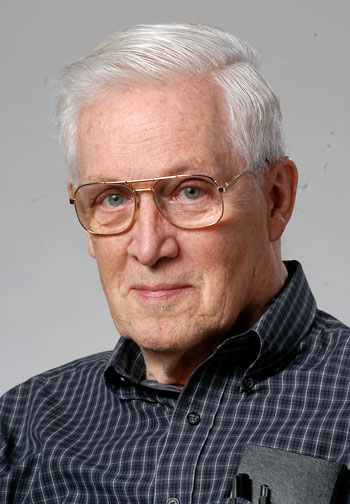Charles Desoer, professor emeritus of electrical engineering and computer sciences, dies
Charles A. Desoer, a professor emeritus of electrical engineering and computer sciences at the UC Berkeley, died Monday at age 84.
November 4, 2010
Charles A. Desoer, a professor emeritus of electrical engineering and computer sciences at the University of California, Berkeley, whose work led to advances in the aerospace and transportation industries, died Monday, Nov. 1, in Oakland of complications from a stroke. He was 84.

Charles Desoer, professor emeritus (Peg Skorpinski photo)
Desoer’s work contributed to substantial progress in the analysis, design and control of linear and nonlinear circuits and systems. These advances led to the burgeoning growth of control applications and benefited the aerospace, transportation, process control and other essential sectors of industry.
His series of seminal textbooks in circuits and control systems “are widely regarded as classics in the field and have set a high standard for their clarity of thought and presentation, as well as a deep commitment to intellectual elegance,” said Shankar Sastry, dean of the College of Engineering.
Desoer was born on Jan. 11, 1926, in Brussels, Belgium. During the German occupation of Belgium in World War II, he fought with the Belgium Resistance and, following the liberation, joined the Belgium Army. He obtained a radio engineer degree from the University of Liege in 1949 and then moved to the United States, where he earned a Sc.D. in electrical engineering from the Massachusetts Institute of Technology in 1953. In 1976, the University of Liege awarded him an honorary Sc.D.
In 1953, he began his career at Bell Labs in Murray Hill, New Jersey, primarily working in the field of network theory. He left there in 1958, joining the faculty at UC Berkeley as a professor of electrical engineering and computer sciences. He continued to serve the campus as professor emeritus after his retirement in 1993.
Desoer wrote more than 100 journal papers. His textbooks include “Linear System Theory” (with Frank Callier); “Linear and Nonlinear Circuits” (with Leon Chua and Ernest Kuh); “Multivariable Feedback Systems” (with Frank Callier); “Feedback Systems: Input-Output Properties (with M. Vidyasagar); “Basic Circuit Theory” (with Ernest Kuh); and “Linear System Theory: the State Space Approach” (with Lotfi Zadeh). Some of these texts are still considered the most authoritative references in circuits, systems and control.
Sastry said Desoer “was a much loved colleague in the Department of Electrical Engineering and Computer Sciences, with a sharp repartee, yet he always had kind words for his colleagues. Former students and junior colleagues remember him for his dedicated mentoring and his strong emphasis on excellence in teaching. He was an exceptionally gifted teacher whose instructional style emphasized clarity of thought and elegance of presentation.”
Desoer supervised 42 doctoral students, who today occupy leadership positions in academia and industry, he said.
Desoer’s major awards included a Guggenheim Fellowship in 1970; the Medal of the University of Liege in 1970; the Distinguished Teaching Award from UC Berkeley in 1971; the Prix Montefiore in 1975; the Institute of Electrical and Electronics Engineers (IEEE) James Mulligan Education Award in 1975; the American Association of Control Education Award in 1983; the IEEE Control Society Technical Field Award in 1986; the Berkeley Citation in 1991; and the Gustav Robert Kirchoff Award of the IEEE in 2011, to be presented posthumously in recognition of his foundational research on circuits and systems. He was a life fellow of the IEEE, a member of the National Academy of Engineering and a fellow of the American Association for the Advancement of Science.
Desoer read widely on the history and philosophy of science, economics and epistemology. His daughter, Michele Desoer, said he was a connoisseur of fine food and good music and loved to travel.
He is survived by his wife, Jacqueline Desoer of Berkeley, and his three children: son Marc Desoer of Thousand Oaks, Calif.; daughter Michele Desoer of Oakland, Calif.; and son Craig Desoer of Walnut Creek, Calif.; and two granddaughters. He also is survived by a sister, Monique Bastiné-Desoer, and a brother, Jean-François Desoer, as well as by several nieces, great-nieces and great-nephews, all of Belgium.
An endowed chair in Desoer’s name has been established in the College of Engineering. The family requests that memorial gifts be made to the Charles A. Desoer Chair and sent to the College of Engineering, UC Berkeley, 208 McLaughlin Hall #1722, Berkeley, CA 94720-1722.